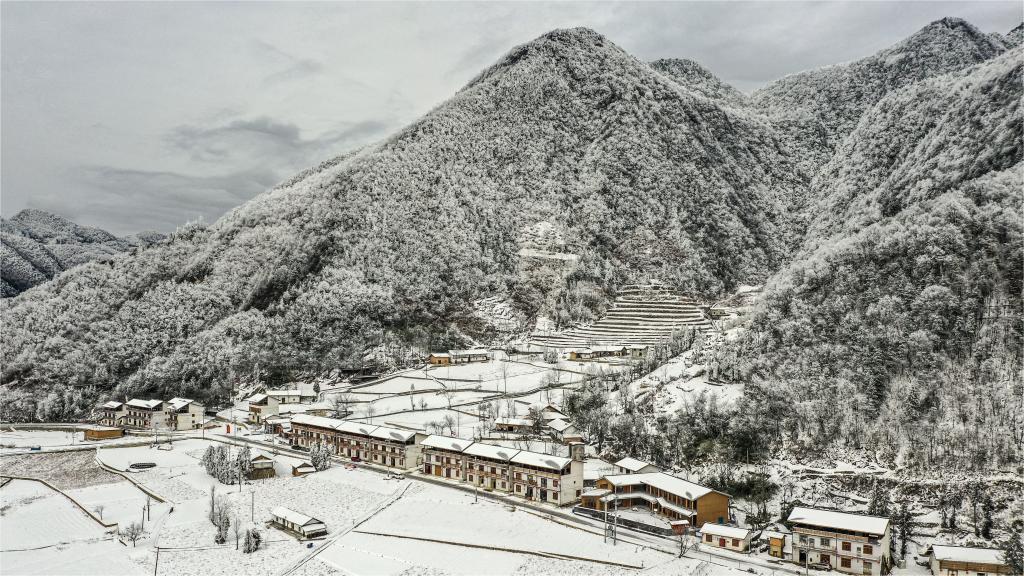With upgrade in ties, China, Uzbekistan ready for closer win-win cooperation

Chinese President Xi Jinping and President of the Republic of Uzbekistan Shavkat Mirziyoyev sign and issue a joint statement between the People's Republic of China and the Republic of Uzbekistan on the all-weather comprehensive strategic partnership for a new era following their talks at the Great Hall of the People in Beijing, capital of China, Jan. 24, 2024. (Xinhua/Yin Bogu)
There has been significant progress in the collaboration between China and Uzbekistan in recent years, especially in reducing poverty, developing new energy, and seeking green development, resulting in tangible benefits for both nations.
BEIJING, Jan. 26 (Xinhua) -- Chinese President Xi Jinping and Uzbek President Shavkat Mirziyoyev announced on Wednesday that the two countries have agreed to elevate bilateral ties to an all-weather comprehensive strategic partnership for a new era. They have pledged to promote building a China-Uzbekistan community with a shared future from an even higher starting point.
High-level exchanges between the two countries in recent years have been close and frequent. And the strategic guidance by the two heads of state holds key to this landmark upgrade in ties.
In September 2022, Xi paid a state visit to the central-Asian country, where he attended the 22nd meeting of the Council of Heads of State of the Shanghai Cooperation Organization. During the visit, the two presidents agreed to deepen the China-Uzbekistan comprehensive strategic partnership for a new era and build a China-Uzbekistan community with a shared future.
And in last year alone, Mirziyoyev visited China twice for the China-Central Asia Summit and the third Belt and Road Forum for International Cooperation (BRF). His just-concluded three-day China visit marks another milestone in bilateral ties.
Apart from announcing the new positioning of bilateral ties, Xi and Mirziyoyev also witnessed the signing of a series of documents concerning the Belt and Road cooperation, economic and technological cooperation, connectivity, environmental protection, new energy, science and culture.
There has been significant progress in the collaboration between the two countries in recent years, especially in reducing poverty, developing new energy, and seeking green development, resulting in tangible benefits for both nations.

Chinese experts exchange planting experience with a local farmer at Humoyun farm in Bayavut district of Syrdarya region, Uzbekistan, Sept. 24, 2020. (Photo by Zafar Khalilov/Xinhua)
FIGHT AGAINST POVERTY
Uzbekistan has intensified efforts to reduce poverty in recent years.
In 2020, Mirziyoyev stated that approximately 12 to 15 percent of the country's population (about 4 to 5 million people) lived in poverty. That same year, Uzbekistan officially made poverty reduction a national priority for the first time.
On May 15 last year, President Mirziyoyev chaired a videoconference to discuss the measures to reduce poverty and ensure employment, during which he noted China has much experience in tackling poverty.
"Considering this experience, a separate anti-poverty program will be implemented in each region of Uzbekistan. It will focus on improving road transport, energy, communication, and tourism infrastructure, developing small and medium-sized cities, and industrialization of mahallas in areas with a high level of poverty," said a statement published on the official website of the President of Uzbekistan.
The country also plans to develop a comprehensive program to lift 14 selected districts out of poverty, according to the statement.
To share China's experience and practices on targeted poverty reduction and eradication, in August, the Chinese Ministry of Agriculture and Rural Affairs hosted an online training program for over 9,500 Uzbek poverty reduction officials.
Mirziyoyev spoke highly of China's effective poverty alleviation measures and detailed his insights into these practices in a foreword written for the Uzbek edition of Xi's book "Up and Out of Poverty," launched in November.
"The book vividly tells the arduous road of poverty alleviation that China has gone through with vivid examples, profoundly summarizes China's practical experience in poverty alleviation, and highlights the hardworking quality of the Chinese people," read the foreword.
The book has rich political, economic and philosophical connotations, wrote Mirziyoyev, which reflects Xi's "profound thinking on poverty alleviation and the well-being of the people."
It is a pleasure to see Uzbekistan and China help each other and move forward together to solve similar or identical development problems, the president wrote, noting his country attaches great importance to the in-depth study of the experience of other countries, especially China, in reducing poverty.

Photo taken on June 4, 2021 shows the city view of Tashkent, Uzbekistan, June 4, 2021. (Photo by Zafar Khalilov/Xinhua)
GREEN FUTURE
Photovoltaic panels from two power plants, each with 500 megawatts of capacity, in the Kashkadarya and Bukhara regions of Uzbekistan reflect dazzling light under the sun.
The construction of the one-gigawatt project, invested by the Gezhouba Group Overseas Investment Co., Ltd., a subsidiary of the China Gezhouba Group Corporation, is underway.
It is the first major new energy project by Chinese-funded enterprises in Central Asia since the China-Central Asia Summit was held last May and also the largest photovoltaic project in the region under the Belt and Road cooperation.
The project's first phase, with a capacity of 400 megawatts, successfully connected to the grid on Dec. 27 last year. The project is expected to generate an annual output of 2.4 billion kilowatt hours, given the country's abundant sunlight.
Clean energy and the Green Silk Road have emerged as prominent focal points under the Belt and Road cooperation and are frequently highlighted by the two heads of state.
During their meeting at the BRF, Xi said that China supports expanding cooperation in areas including new energy and innovation.
Noting that establishing a scientific information platform on the Green Silk Road is crucial to laying the foundation for a green future, Mirziyoyev said that Uzbekistan is ready to further deepen green cooperation with Belt and Road partner countries to create a green future for mankind.

A train is seen at the Qamchiq Tunnel on the Angren-Pap railway line in Uzbekistan, Feb. 27, 2016. (Xinhua/Shadati)
TANGIBLE BENEFITS
Despite the great distance, Makhbubakhon Abdulazizova, a resident of Uzbekistan's Namangan Region, feels close to China. For a long time, the mountains stretching more than 2,000 km blocked the eastern region of Uzbekistan and other areas.
Chinese builders braved hardships and danger to complete the construction of the Angren-Pap railway tunnel, including the Qamchiq Tunnel, which is known as the longest railway tunnel in Central Asia, traversing various complex geological environments and turning the natural chasm into a thoroughfare.
The 72-year-old resident said he could only see close relatives once a year or two due to a lack of convenient transport. "After the tunnel was put into use, the traffic became very convenient. We can meet every half month. We are very grateful to the Chinese builders," he said.
But the relationship with China is more than bolstering transport connectivity. "Mutual cooperation in personnel training and the development of human capital is a crucial area that can help us fully unlock our existing potential," Timur Abdullaev, head of the International Cooperation Division of the Agency for the Development of Public Service under the President of the Republic of Uzbekistan, told Xinhua.
The Olympic City project, designed and built by Chinese enterprises, has contributed to deepening China-Uzbekistan cultural and sports cooperation, enhancing people-to-people exchanges and promoting win-win development.
The project is "of historic significance to Uzbekistan," the Uzbek president said.
Upon completion, the project will be the largest sports complex in Central Asia. It will be the main venue for the Asian Youth Games and Asian Youth Para Games in 2025 and mark Uzbekistan's first time holding international events of this scale.
Nodirbek Pirnapasov, a senior business manager of the project, said that he learned new technologies and became acquainted with a different culture working with his Chinese colleagues.
Impressed by the professionalism of the Chinese team, he said that he was "very proud to be a part of the project."
Photos
Related Stories
- Xi, Macron eye stronger ties
- Nation ready to work more closely with Antigua and Barbuda
- Infographics: President Xi's instructions on China's development of ice and snow economy
- Xi delivers video speech to reception celebrating 60th anniversary of China-France diplomatic relations
- Sino-Uzbek ties lifted to new height
Copyright © 2024 People's Daily Online. All Rights Reserved.









